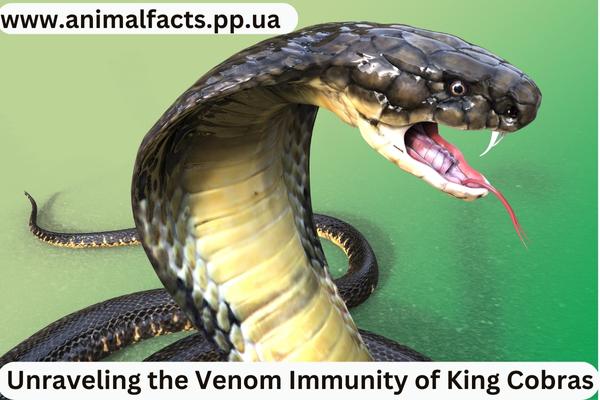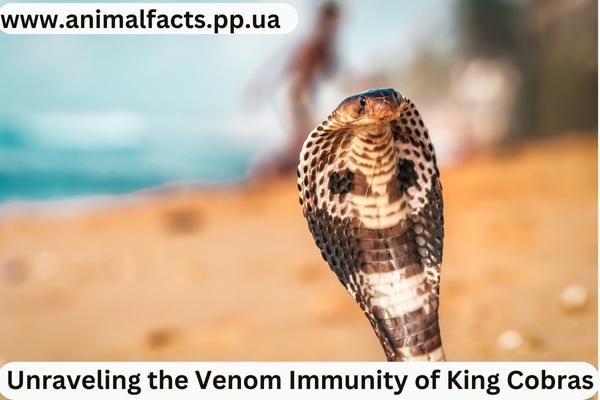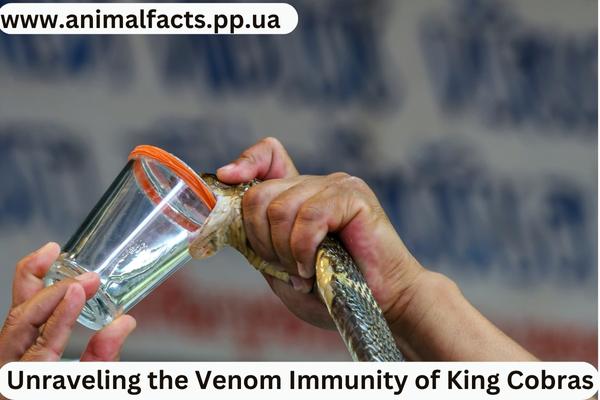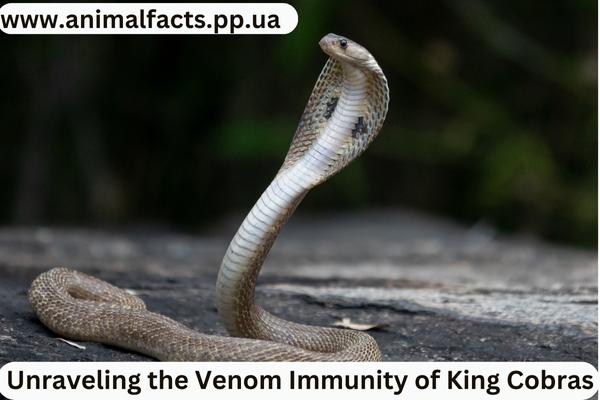Unraveling the Venom Immunity of King Cobras
Introduction:
The king cobra, one of the world’s most majestic and venomous snakes, possesses a fascinating adaptation that sets it apart from other species – venom immunity. This article will delve into the intricate world of king cobra venom immunity,
exploring the mechanisms that enable this remarkable adaptation and shedding light on its significance in snake biology and potential medical applications.
Understanding King Cobra Venom:
King cobras are renowned for their potent venom, which contains a complex cocktail of enzymes and toxins. We will discuss the composition of king cobra venom, its effects on prey and potential predators, and the unique challenges it poses for understanding venom immunity.
The Mechanisms of Venom Immunity:

King cobras exhibit an extraordinary ability to be immune to their venom and the venom of other snake species. We will unravel the biological mechanisms that underpin this immunity, including genetic adaptations, specialized enzymes, and immune system responses.
By understanding these mechanisms, scientists hope to unlock new insights into the broader field of venom immunity research.
Evolutionary Significance:
The evolution of venom immunity in king cobras raises intriguing questions about the evolutionary arms race between venomous snakes and their prey.
We will explore the possible selective pressures that have shaped this adaptation and the advantages it provides to the survival and reproductive success of king cobras in their natural habitats.
Medical Implications:
The study of venom immunity in king cobras holds promise for medical applications. Researchers are investigating the potential therapeutic properties of king cobra venom and the immune responses associated with venom immunity.
We will discuss the ongoing research in this area, including developing novel treatments for snakebites and exploring venom components as potential drug candidates.
Conservation and Conservation Challenges:
Understanding the venom immunity of king cobras is crucial for conservation efforts to protect these magnificent snakes and their habitats.
We will highlight their conservation challenges, including habitat loss, poaching, and the illegal wildlife trade, and emphasize the importance of preserving their unique adaptations.
Types of Immunity of King Cobras

1. Innate Immunity:
Innate immunity is the first line of defense in king cobras, providing immediate protection against various pathogens. This type of immunity is present from birth and includes physical barriers, antimicrobial peptides, and phagocytic cells that rapidly recognize and neutralize potential threats.
2. Adaptive Immunity:
Adaptive immunity in king cobras is a sophisticated defense mechanism that evolves in response to specific pathogens.
This type of immunity involves the production of antibodies and immune cells that target and eliminate specific foreign substances, such as bacteria, viruses, or toxins.
King cobras can mount specific immune responses to a wide array of threats encountered in their environment.
3. Venom Immunity:
One of the most intriguing aspects of king cobra’s immune systems is their ability to be immune to their venom.
King cobras produce a potent venom that can be lethal to other animals but possess specialized adaptations that render them immune to its toxic effects.
These adaptations include modifications in the structure and function of proteins and enzymes and enhanced detoxification mechanisms.
4. Environmental Adaptations:
King cobras have also developed immune adaptations to cope with their unique habitats. They possess physiological mechanisms that help them withstand extreme temperatures, resist dehydration, and combat infections caused by environmental microorganisms.
These adaptations allow them to thrive in diverse ecosystems, including rainforests, grasslands, and mangrove swamps.
5. Behavioral Immunity:
In addition to physiological adaptations, king cobras exhibit behavioral strategies contributing to their immune defense. They are highly alert and possess remarkable agility, which enables them to avoid potential threats or engage in defensive behaviors when necessary.
Their ability to assess and respond to danger is crucial in avoiding venomous bites and minimizing the risk of infections.
6. Maternal Immunity:
King cobras possess a form of maternal immunity where antibodies are transferred from the mother to her offspring through the egg yolks or milk. This passive transfer of immune molecules provides early protection to the hatchlings, aiding in their survival during the vulnerable stages of development.
7. Wound Healing and Tissue Regeneration:
King cobras demonstrate exceptional wound healing abilities, including rapid closure of wounds and efficient tissue regeneration. Their immune system plays a crucial role in this process by orchestrating the recruitment of immune cells, promoting cell proliferation, and facilitating tissue repair.
8. Antimicrobial Peptides:

King cobras produce a variety of antimicrobial peptides, which are small proteins that possess potent antimicrobial properties. These peptides can directly kill or inhibit the growth of bacteria, fungi, and other microorganisms, providing an additional line of defense against infections.
9. Antivenom Production:
Although not a direct form of immunity, king cobras have been instrumental in the production of antivenom to treat snakebite victims. By injecting small, non-lethal doses of venom into animals, scientists can stimulate the production of specific antibodies in the animals’ immune systems. These antibodies are then harvested and used to create antivenom, which can neutralize the effects of king cobra venom in humans.
10. Stress Response:
King cobras have evolved mechanisms to cope with stress, which can be an immune-modulating factor. They exhibit stress responses that include changes in hormone levels, metabolic adjustments, and immune system modulation. These adaptations help them manage physiological stressors and maintain overall health and survival.
Conclusion:
The venom immunity of king cobras represents a captivating area of research that offers insights into the complex interplay between venomous snakes and their environment.
By unraveling the mechanisms and evolutionary significance of this adaptation, scientists are expanding our understanding of snake biology and opening up new possibilities in medicine and conservation.
The ongoing exploration of king cobra venom immunity can revolutionize our approaches to snakebite treatments and inspire conservation strategies that ensure the survival of these iconic serpents for future generations. Click Here For More Information About Reptiles.

